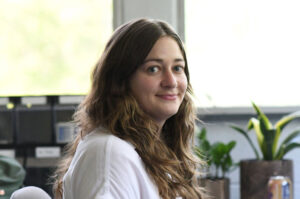Taylor West is a Ph.D. candidate within the Department of Psychology and Neuroscience in the social psychology doctoral program at the University of North Carolina at Chapel Hill. The department is housed in the College of Arts and Sciences. She has been awarded the Laura Mayer Summer Research Fellowship as she works to complete her dissertation on positive emotions stemming from interactions between strangers including in the areas of political debate and workplace colleague interactions. Prior to attending UNC-Chapel Hill she attended Northern Arizona University, where she completed a thesis studying quiet-ego and self-centric motivation. She then moved to Germany where she taught English for several years before enrolling at UNC-Chapel Hill to focus on her research.
This interview has been edited for length and clarity.
Support graduate students like TaylorTell us about your research.

I initially came to Carolina to work with Barbara Frederickson [Kenan Distinguished Professor and director of the Positive Emotions and Psychophysiology Lab at UNC-Chapel Hill] on emotion and well-being. She has developed a new theory on shared positive emotions as a marker of social connection. I quickly became interested in understanding shared positive emotions between strangers. I was interested in how, especially coming out of COVID-19, we connect with the people in our community. Right now, I’m researching how positive interactions with strangers and acquaintances can lead you to be more open and kind, particularly toward people you may be dissimilar to. Some of my studies look at political opponents and another study looks at disagreeing colleagues in the workplace, but I don’t think it’s isolated to those contexts. It’s the idea that more exposure to broad perspectives when meeting different people will make you generally more kind.
Why is this topic important to you?
When I left Germany, I didn’t necessarily think I’d be studying connecting with strangers. As time went by, though, I kept thinking about the different people I met in Germany and how much it made me feel connected to the world. I really like meeting new people and learning about different cultures and history. The more I studied positive interactions between strangers, the more the issue seemed intuitive yet overlooked. People know that having a positive connection is probably good, but I don’t think they really know why it is important in a community or society. What are the actual consequences? If we can understand that, then people or policy makers might care more about trying to promote contexts where that’s more accessible. How can we shape our communities in ways that allow for people to have these positive interactions rather than having an environment that leaves people feeling unsafe? It’s a personal interest, but I also think there’s a lot about connecting with strangers that’s important for communities and individuals.
How has your research impacted you as a person?
As I started studying positive connections I started noticing them more in my community. Even just noticing these positive interactions can lead to a mood boost. I pay attention to those moments of kindness that are observed when I’m out and about. It helps me feel connected and like the world is a safe place where people are generally trying to be kind. I’ve also become more curious.
What do you hope comes of your research?
In addition to having some of my research published, I’m hoping to write general articles for lay audiences. I think this kind of work will be interesting to people and there are a lot of implications of the research that I feel should be shared outside of the scientific community. I want to develop a research program and a brand I can make a career on. I’m looking into post-doctoral opportunities to continue researching with other experts in the field and applying to faculty positions where I can begin my own lab and carry out my research program.
What will the funding from your Summer Research Fellowship allow you to do, and what does it mean to you?
Normally in the summer I would either have to teach or work on someone else’s project. I also teach during the school year, so summer is a nice time to catch up. My dissertation is four studies. The first two I already have data for, so I’m working on cleaning and analyzing that. The other big task is a new data collection for my fourth study. I’m finishing up the design details so I can submit my study to the Institutional Review Board and launch it when the fall semester starts.
It was really important this summer that I had the space to dedicate all my time and attention toward advancing my dissertation projects. As I enter my final year, I’m trying to get my name out there as a scientist to make connections in the field. This is a critical time to be able to focus on my own ideas because this is the time I’m going to be applying to my next positions.
What does it mean to have generous donors who support your research?
It’s validating to have others recognize the importance of my research. I have a lot of gratitude for people who set aside money to fund graduate students who need to survive through the summer. Especially in a field where you’re always putting yourself out there on applications and fellowships, it’s a really rewarding feeling to be acknowledged in this way.
— Payton Wilkins
